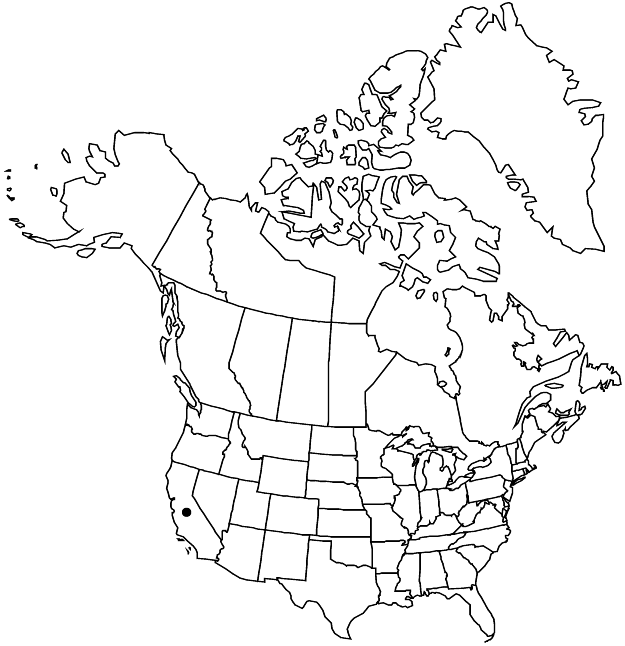Difference between revisions of "Eriogonum umbellatum var. torreyanum"
Contr. W. Bot. 11: 5. 1903.
FNA>Volume Importer |
FNA>Volume Importer |
||
| Line 27: | Line 27: | ||
|elevation=(1800-)2100-2400 m | |elevation=(1800-)2100-2400 m | ||
|distribution=Calif. | |distribution=Calif. | ||
| − | |discussion=<p>Variety torreyanum is found only in Nevada, Placer, and Sierra counties in the Sierra Nevada. Many of its historic sites were destroyed by road construction and development, especially to the west and north of Lake Tahoe, and the number of extant populations is limited. In fact, most collections of these plants were gathered prior to 1900. This variety and var. glaberrimum are distinctive within E. umbellatum, as both have glandular rather than hairy bractlets subtending the pedicel. Variety torreyanum might reasonably be recognized at the species level were it not for its occasional introgression with var. nevadense (T. M. Kan 1992). It rarely is seen in cultivation.</p> | + | |discussion=<p>Variety torreyanum is found only in <i>Nevada</i>, Placer, and Sierra counties in the Sierra <i>Nevada</i>. Many of its historic sites were destroyed by road construction and development, especially to the west and north of Lake Tahoe, and the number of extant populations is limited. In fact, most collections of these plants were gathered prior to 1900. This variety and <i></i>var.<i> glaberrimum</i> are distinctive within <i>E. umbellatum</i>, as both have glandular rather than hairy bractlets subtending the pedicel. Variety torreyanum might reasonably be recognized at the species level were it not for its occasional introgression with <i></i>var.<i> nevadense</i> (T. M. Kan 1992). It rarely is seen in cultivation.</p> |
|tables= | |tables= | ||
|references= | |references= | ||
| Line 51: | Line 51: | ||
|publication year=1903 | |publication year=1903 | ||
|special status= | |special status= | ||
| − | |source xml=https://jpend@bitbucket.org/aafc-mbb/fna-data-curation.git/src/ | + | |source xml=https://jpend@bitbucket.org/aafc-mbb/fna-data-curation.git/src/8f726806613d60c220dc4493de13607dd3150896/coarse_grained_fna_xml/V5/V5_713.xml |
|subfamily=Polygonaceae subfam. Eriogonoideae | |subfamily=Polygonaceae subfam. Eriogonoideae | ||
|genus=Eriogonum | |genus=Eriogonum | ||
Revision as of 17:40, 18 September 2019
Herbs, compact mats, 1–3.5 × 4–8 dm. Aerial flowering stems erect, 1–2 dm, glabrous, without one or more leaflike bracts ca. midlength. Leaves in loose rosettes; blade elliptic to broadly elliptic, 1–3(–4) × 1–2 cm, glabrous and dark green on both surfaces, margins plane. Inflorescences umbellate; branches 3–10 cm, glabrous, with a whorl of bracts ca. midlength; involucral tubes 5–7 mm, lobes 2–5 mm. Flowers 7–10 mm; perianth bright yellow. 2n = 40.
Phenology: Flowering Jul–Sep.
Habitat: Sandy to gravelly granitic slopes, buckbrush and manzanita communities, montane conifer woodlands
Elevation: (1800-)2100-2400 m
Discussion
Variety torreyanum is found only in Nevada, Placer, and Sierra counties in the Sierra Nevada. Many of its historic sites were destroyed by road construction and development, especially to the west and north of Lake Tahoe, and the number of extant populations is limited. In fact, most collections of these plants were gathered prior to 1900. This variety and var. glaberrimum are distinctive within E. umbellatum, as both have glandular rather than hairy bractlets subtending the pedicel. Variety torreyanum might reasonably be recognized at the species level were it not for its occasional introgression with var. nevadense (T. M. Kan 1992). It rarely is seen in cultivation.
Selected References
None.
